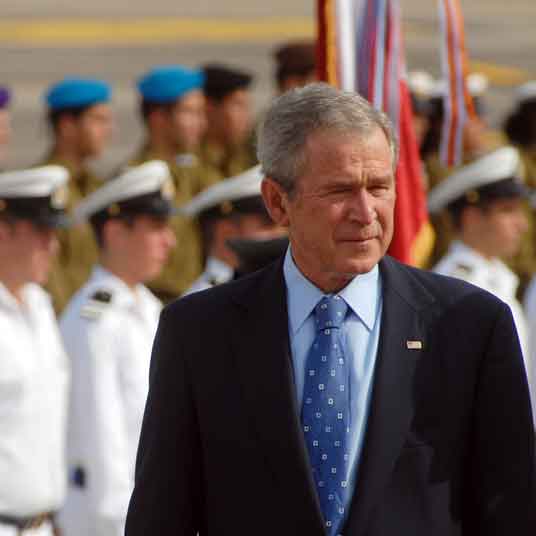George W. Bush, the former President of the United States, has elected not to endorse any candidate for the looming 2024 presidential election. This decision comes amid a politically charged climate where other notable Republicans have varied stances on the race.
According to a statement released to NBC News by Bush’s office, “President Bush retired from presidential politics years ago.” This succinct remark encapsulates the 43rd President’s current position on involvement in presidential elections, reflecting his recent behavior in previous elections.
The decision by Bush not to endorse any candidate is in stark contrast to his former Vice President, Dick Cheney’s choice. In a surprising move, Cheney has voiced his support for Democratic nominee, Vice President Kamala Harris, for the upcoming election. Cheney justifies this decision with a potent assertion that Donald Trump presents an exceptional threat to the American Republic, accusing him of trying to illegally hold onto power through deception and violence after losing the previous election. Cheney was adamant that Trump should never be given a position of authority again.
This is not Bush’s first time refraining from endorsing a presidential candidate. In the 2020 election, he also chose not to publicly support any candidate. An interview with People magazine later revealed that Bush had written in the name of Condoleezza Rice, his former Secretary of State, on his ballot. For the 2016 election, a spokesperson for Bush confirmed that the ex-president had left the presidential section of his ballot blank.
Since leaving office, Bush’s approach to presidential politics has shifted. In his post-presidential years, he endorsed Republican nominees John McCain in 2008 and Mitt Romney in 2012. But since 2004, when he was the incumbent President running for re-election, he has not attended a Republican National Convention. His last convention appearance was in 2008, where he addressed the gathering remotely from the White House.
Bush’s decision not to endorse a candidate is coinciding with a time of internal divisions in the Republican Party and the ongoing influence of former President Donald Trump. As of July 2024, the majority of currently serving Republican senators and representatives have endorsed Trump’s 2024 campaign. This includes 42 of the 49 Republican senators and 192 of the 220 Republican representatives.
Among the notable Republican figures who have endorsed Trump are Senate Minority Leader Mitch McConnell, Senators Ted Cruz and Lindsey Graham, and Representatives Steve Scalise and Jim Jordan. On the state level, 25 of the 27 incumbent Republican governors have endorsed Trump’s presidential bid.
However, Bush is not alone in his decision to abstain from endorsing. Among the living GOP presidential and vice presidential nominees, only Sarah Palin, McCain’s running mate in 2008, has publicly supported Trump for the 2024 race.
On the Democratic side, Vice President Kamala Harris has secured endorsements from various party leaders and officeholders. Senators Elizabeth Warren, Amy Klobuchar, and Tim Kaine have all expressed their support for Harris, as have Governors Gavin Newsom of California and Kathy Hochul of New York.
The 2024 presidential race has also witnessed some significant cross-party endorsements. Besides Dick Cheney, several other Republicans have announced their intention to support Harris, including former members of Congress and state legislators. Conversely, a handful of Democrats, including some former governors and state legislators, have crossed party lines to endorse Trump.
As the 2024 presidential race continues, the decisions to endorse or abstain from political figures like George W. Bush are predicted to be central points of discussion and analysis. While some are vocal in their support, others, like the 43rd President, prefer to remain on the sidelines.

